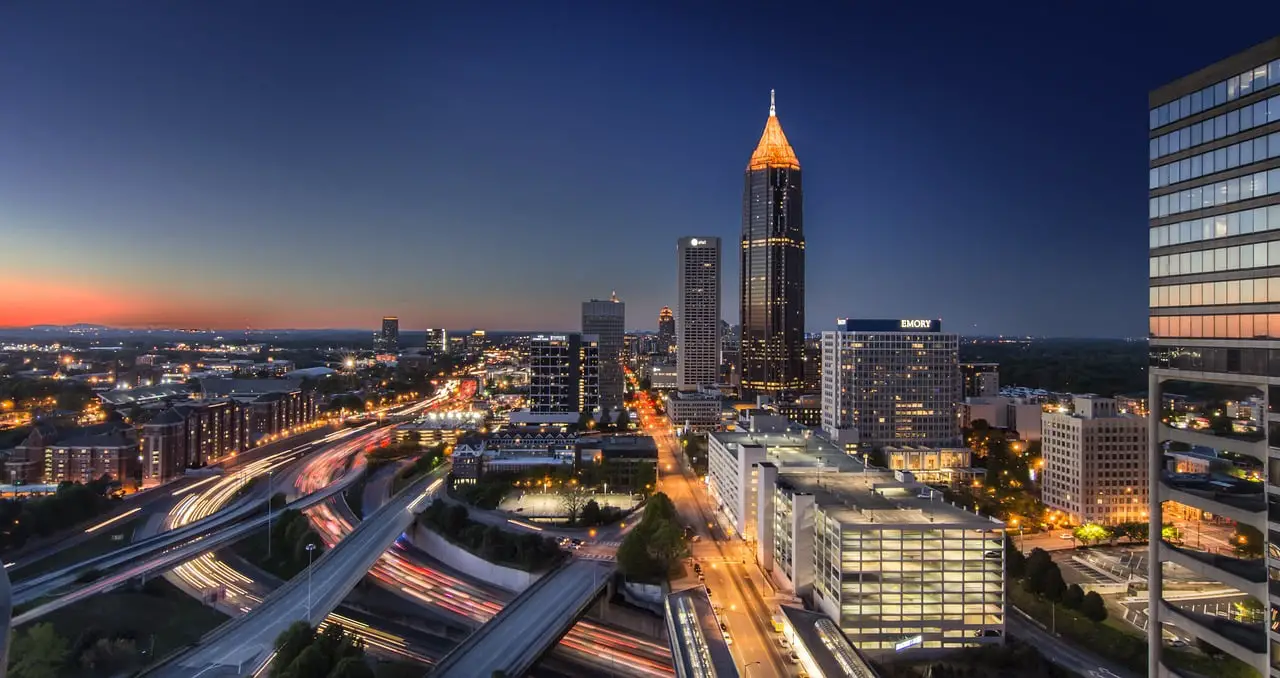Atlanta is known as one of the fastest-growing cities in the United States, with a population of over 5 million people. Founded in 1837 as a railroad terminus, Atlanta has transformed into a global metropolis over the years. Today, it is famous for its cultural institutions, professional sports teams, a growing economy, and a bustling dynamic city center.
This article highlights Atlanta’s journey to becoming a global metropolis, including its transformation and struggle against racism, urban decay, and economic slowdown. We will explore how several visionary leaders, including Maynard Jackson, Andrew Young, and Shirley Franklin, contributed to the city’s growth, making it the vibrant, global city that it is today.
The Beginning of Atlanta’s Transformation
At the turn of the 20th century, Atlanta was a small, rural town known for its cotton production and located on a major transportation system. The city experienced rural-urban migration that saw African Americans and whites moving into the city, raising its population rapidly. This migration provided the city with a growth stimulus, but racial tensions exploded in the 1906 race riots that saw whites lynch over 25 black people.

As the civil rights movement gathered steam, Atlanta made strides towards racial equality that would later pave the way for its transformation. The City’s leadership empowered black Americans, making them part of its economic, social, and political fabric. Visionary leaders like Maynard Jackson, Atlanta’s first black mayor, took bold steps, such as implementing affirmative action policies to ensure that minorities receive equal opportunities to participate in the city’s economy.
During Jackson’s tenure, Atlanta became an airport transportation hub thanks to the opening of the Hartsfield-Jackson Atlanta International airport. The airport created jobs and attracted businesses to the region, further cementing its economic resilience. Atlanta was proud to be the city where no one had to change planes to travel to any other city in the world. This position made it the most important Southern city to Amazon’s location choice of a major distribution center in 2018.
The policies implemented by Jackson created an environment that allowed for minority entrepreneurship to thrive. Today, Atlanta is home to several black-owned businesses that generate millions of dollars in revenue, including Anthony Hamilton and Tiwa Works, and Nicole Garner Scott’s The Garner Circle, which creates PR campaigns for fashion brands.
Wandering the World: A Globe-Trotter’s Diary(Opens in a new browser tab)
Atlanta’s economy also grew, thanks to federal investments that aided in the city’s renaissance. In 1996, Atlanta hosted the Summer Olympics, which was a defining moment that helped solidify its status as an economic powerhouse. The city invested over $2.3 billion in infrastructure, including roads, public transportation, and parks to accommodate the influx of visitors for the Games.
The Olympics also brought about the creation of several sports stadiums, including Centennial Olympic Park and the Georgia Dome, which is now the Mercedes-Benz Stadium that is home to the Atlanta Falcons and Atlanta United FC. Besides, Atlanta’s thriving music industry, film, and television industries also emerged thanks to the many sound stages and film studios built for the Games.
The Role of Andrew Young and Shirley Franklin
Atlanta’s transformation was not without challenges, and two visionary leaders, Andrew Young and Shirley Franklin, played key roles. Andrew Young, a former mayor and civil rights activist, focused on attracting foreign investment and promoting Atlanta as a destination for business, tourism, and entertainment.
The creation of the Atlanta International Affairs Council (now the Atlanta Council for International Relations) and the Georgia-Pacific International Tower helped make this a reality. Also, Andrew Young presented Atlanta as an ambassador of goodwill, fostering a relationship with African nations, which helped attract investors and tourists to the city.
Shirley Franklin, Atlanta’s first female mayor, focused on addressing the city’s infrastructure problems and reducing crime rates. She implemented a $3.9 billion water and sewer system upgrade, improved public transportation, and led the acquisition of over 5,600 acres of green space within the city.
Franklin’s policies on public safety, particularly in underserved neighborhoods, helped reduce the city’s crime rates. She also invested in community policing, creating partnerships between the police and the communities they serve.
These leaders’ policies and investments helped solidify Atlanta’s status as a global city.
The Revitalization of Detroit: A Story of Resilience and Renewal(Opens in a new browser tab)
Moving Forward
Atlanta’s journey to becoming a global metropolis has not been without its challenges. The COVID-19 pandemic disrupted the city’s economy, forcing many businesses to close temporarily or permanently, leading to layoffs and a rise in unemployment rates.
The death of George Floyd brought to the fore Atlanta’s long-standing issues with police brutality and racism, leading to protests that rocked the city’s downtown area. However, the city remained resilient, and the protests led to several reforms, including charges against two police officers involved in the shooting of Rayshard Brooks and an increase in funding for social justice initiatives.
The Future of Atlanta
Atlanta’s future involves a continued push towards becoming a more inclusive, equitable, and resilient city. The City’s current mayor, Keisha Lance Bottoms, has pledged to continue Franklin’s investment in affordable housing and infrastructure, including increasing investment in public transportation.
The city’s efforts to attract businesses have borne fruit, with companies such as Microsoft, Amazon, and Google opening offices in the area. These companies have invested in the city’s technology sector, known as the Silicon Valley of the South, further solidifying Atlanta’s position as a global city.
Atlanta is also playing a growing role in addressing social justice issues. The city is home to several nonprofits and social justice organizations that aim to tackle issues such as inequality and racial injustice. These organizations work with city leaders to effect change at a grassroots level, and this partnership helped foster some reforms after the George Floyd protests.
FAQs
Q: What challenges did Atlanta face in becoming a global city?
A: Atlanta faced challenges with racism, urban decay, and economic slowdown. It was not until visionary leaders like Maynard Jackson, Andrew Young, and Shirley Franklin, implemented policies and reforms that addressed these challenges, that the city began its transformation.
Discover the Top Free Things to Do in Atlanta(Opens in a new browser tab)
Q: What is Atlanta’s economy driven by?
A: Atlanta’s economy is driven by several sectors, including finance, healthcare, technology and is also an important hub for transportation and logistics. The City is home to major companies such as the Coca-Cola Company, Delta Air Lines, and Home Depot.
Q: What does the future hold for Atlanta?
A: Atlanta is poised to become a more inclusive, equitable, and resilient city. The City’s current mayor has pledged to continue the city’s investment in affordable housing, infrastructure, and public transportation. Additionally, Atlanta is playing a growing role in addressing social justice issues and playing an important role in the global economy.





